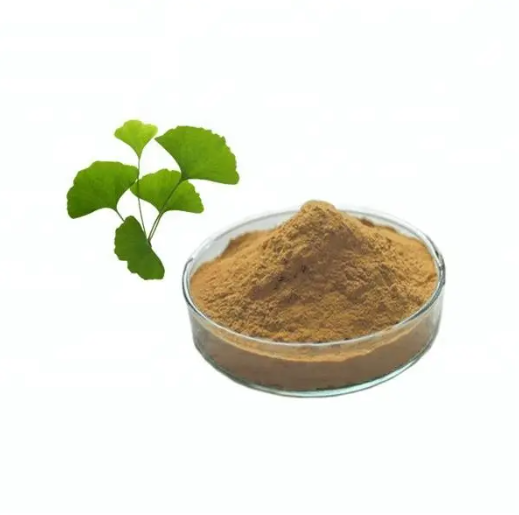
CASNo.: 90045-36-6
Ginkgo Biloba Extract
CAS No.: 90045-36-6
HS Code:2932999099
Specification:Food/Feed/Pharmaceutical Grade
Packing:25kg bag/drum/carton
Ginkgo (Ginkgo biloba; pinyin romanization: yín xìng,Hepburn romanization: ichō or ginnan, Vietnamese: bạch quả), also spelled gingko and also known as the maiden hair tree, is a unique species of tree with no living relatives. The ginkgo is a living fossil, recognisably similar to fossils dating back 270 million years. Native to China, the tree is widely cultivated and was introduced early to human history. It has various uses in raditional medicine and as a source of food.
Application
Culinary use
The nut-like gametophytes inside the seeds are particularly esteemed in Asia, and are at raditional Chinese food. Ginkgo nuts are used in congee, and are often served at special occasions such as weddings and the Chinese New Year (as part of the vegetarian dish called Buddha’s delight). In Chinese culture, they are believed to have health benefits; some also consider them to have aphrodisiac qualities.Japanese cooks add ginkgo seeds (called ginnan) to dishes such as chawanmushi,and cooked seeds are often eaten along with other dishes.
Potential medicinal uses
Extracts of ginkgo leaves contain flavonoid glycosides (myricetin and quercetin) and terpenoids (ginkgolides, bilobalides)and have been used pharmaceutically. These extracts are shown to exhibit reversible, nonselective monoamine oxidase inhibition, as well as inhibition of reuptake at the serotonin, dopamine, and norepinephrine transporters, with all but the norepinephrine reuptake inhibition fading in chronic exposure. Ginkgo extract has in addition been found to act as a selective 5-HT1A receptor agonist in vivo. Ginkgo supplements are usually taken in the range of 40–200 mg per day. In 2010, ameta-analysis of clinical trials has shown Ginkgo to be moderately effective in improving cognition in dementia patients but not preventing the onset of Alzheimer’s disease in people without dementia. In research not yet confirmed by clinical or govern mental agencies, ginkgo may have some efficacy in treating the symptoms of schizophrenia.
Specification
| ITEMS | STANDARD |
| Appearance | Yellow-brown powder |
| Bulk density | 0.35~0.55g/ml |
| Loss on drying | =<5.0% |
| Ash | =<5.0% |
| Total Plate Count | <1000cfu/g |
| Yeast&Mold | <100cfu/g |
| Heavy metal | =<10ppm |
